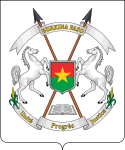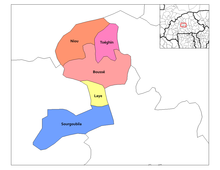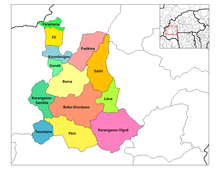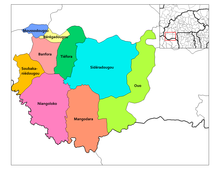Departments of Burkina Faso
 |
|---|
The provinces of Burkina Faso are divided into 351 departments (as of 2014 and since local elections of 2012), whose urbanized areas (cities, towns and villages) are grouped into the same commune (municipality) with the same name as the department. The department also covers rural areas (including national natural parks) that are not governed locally by the elected municipal council of the commune (presided by its mayor, with representants elected for each village or urban sector), but by the state represented at departmental level by a prefect (supervized by the haut-commissaire of its province, themself assisted by a general secretary and acting under the hierarchic authority the governor of its region, all of them being nominated by the national government).

Status of communes
[edit]The 351 communes (municipalities) created for each one of these departments have three kinds of status :
- 49 urban communes are grouping their main city/town (subdivided into urban sectors) and all other administrative villages in their department; in these 49 urban communes, the main city or town is subdivided into urban sectors (within the two communes with special status, each urban sector of the capital city belongs to only one arrondissement, which may also include other surrounding villages outside the capital city). These 49 urban communes include:
- the capital town (or city) of each one of the 45 provinces (and of the 13 regions); among them, 2 urban communes have a particular status: the Ouagadougou and Bobo-Dioulasso departments, that are further subdivided into "arrondissements";
- the commune of 4 additional departments, whose capitals are now large towns covering their respective urban areas (subdivided into urban sectors rather than former separate villages) : Bittou, Garango, Niangoloko and Pouytenga.
- 302 rural communes are grouping all administrative villages in their department.[1][2] Their capitals are still considered officially as "villages", because they also cover a large rural area with dispersed population (with some exceptions expansion, notably around the largest cities of the country, whose urbanized agglomerations are expanding towards the rural area of their bordering departments and absorbing their villages; some of these departments may become urban communes as well, integrating their former villages into urban sectors of their reformed commune).
Departments (or communes) generally have the same name as their capital city or town, with a few exceptions (for historical reasons). For the local elections in 2012, communes were created in each department that still did not have one (village councils were kept but operate at advisory level under the supervision of their commune: each administrative village or urban sector elects at least 2 seats in the municipal council of their commune; for other elections at regional or national level, the smallest electoral circumscription is the whole department).
List of departments or communes by region and by province
[edit]- Type of departments : (rur.) rural commune ; (urb.) urban commune ; (urb.p.s.) urban commune with particular status (subdivided in arrondissements).

- Komki-Ipala (rur.)
- Komsilga (rur.)
- Koubri (rur.)
- Ouagadougou (urb.p.s.)
(provincial, regional and national capital) - Pabré (rur.)
- Saaba (rur.)
- Tanghin-Dassouri (rur.)

- Boudry (rur.)
- Kogho (rur.)
- Méguet (rur.)
- Mogtédo (rur.)
- Salogo (rur.)
- Zam (rur.)
- Zorgho (urb.)
(provincial capital) - Zoungou (rur.)

- Boussé (urb.)
(provincial capital) - Laye (rur.)
- Niou (rur.)
- Sourgoubila (rur.)
- Toéghin (rur.)


- Bourzanga (rur.)
- Guibaré (rur.)
- Kongoussi (urb.)
(provincial capital) - Nasséré (rur.)
- Rollo (rur.)
- Rouko (rur.)
- Sabcé (rur.)
- Tikaré (rur.)
- Zimtenga (rur.)

- Boala (rur.)
- Boulsa (urb.)
(provincial capital) - Bouroum (rur.)
- Dargo (rur.)
- Nagbingou (rur.)
- Tougouri (rur.)
- Yalgo (rur.)
- Zéguédéguin (rur.)



- Arbollé (rur.)
- Bagaré (rur.)
- Bokin (rur.)
- Gomponsom (rur.)
- Kirsi (rur.)
- Lâ-Todin (rur.)
- Pilimpikou (rur.)
- Samba (rur.)
- Yako (urb.)
(provincial capital)

- Barga (rur.)
- Kaïn (rur.)
- Kalsaka (rur.)
- Kossouka (rur.)
- Koumbri (rur.)
- Namissiguima (rur.)
- Ouahigouya (urb.)
(provincial and regional capital) - Oula (rur.)
- Rambo (rur.)
- Séguénéga (rur.)
- Tangaye (rur.)
- Thiou (rur.)
- Zogoré (rur.)


- Déou (rur.)
- Gorom-Gorom (urb.)
(provincial capital) - Markoye (rur.)
- Oursi (rur.)
- Tin-Akoff (rur.)

- Bani (rur.)
- Dori (urb.)
(provincial and regional capital) - Falagountou (rur.)
- Gorgadji (rur.)
- Sampelga (rur.)
- Seytenga (rur.)

- Arbinda (rur.)
- Baraboulé (rur.)
- Diguel (rur.)
- Djibo (urb.)
(provincial capital) - Kelbo (rur.)
- Koutougou (rur.)
- Nassoumbou (rur.)
- Pobé-Mengao (rur.)
- Tongomayel (rur.)


- Bilanga (rur.)
- Bogandé (urb.)
(provincial capital) - Coalla (rur.)
- Liptougou (rur.)
- Manni (rur.)
- Piéla (rur.)
- Thion (rur.)

- Diabo (rur.)
- Diapangou (rur.)
- Fada N′Gourma (urb.)
(provincial and regional capital) - Matiacoali (rur.)
- Tibga (rur.)
- Yamba (rur.)

- Bartiébougou (rur.)
- Foutouri (rur.)
- Gayéri (urb.)
(provincial capital)



- Bagré (rur.)
- Bané (rur.)
- Béguédo (rur.)
- Bissiga (rur.)
- Bittou (urb.)
- Boussouma (rur.)
- Garango (urb.)
- Komtoèga (rur.)
- Niaogho (rur.)
- Tenkodogo (urb.)
(provincial and regional capital) - Zabré (rur.)
- Zoaga (rur.)
- Zonsé (rur.)

- Comin-Yanga (rur.)
- Dourtenga (rur.)
- Lalgaye (rur.)
- Ouargaye (urb.)
(provincial capital) - Sangha (rur.)
- Soudougui (rur.)
- Yargatenga (rur.)
- Yondé (rur.)

- Andemtenga (rur.)
- Baskouré (rur.)
- Dialgaye (rur.)
- Gounghin (rur.)
- Kando (rur.)
- Koupéla (urb.)
(provincial capital) - Pouytenga (urb.)
- Tensobentenga (rur.)
- Yargo (rur.)

- Doulougou (rur.)
- Gaongo (rur.)
- Ipelcé (rur.)
- Kayao (rur.)
- Kombissiri (urb.)
(provincial capital) - Saponé (rur.)
- Toécé (rur.)



- Bingo (rur.)
- Imasgo (rur.)
- Kindi (rur.)
- Kokologho (rur.)
- Koudougou (urb.)
(provincial and regional capital) - Nanoro (rur.)
- Nandiala (rur.)
- Pella (rur.)
- Poa (rur.)
- Ramongo (rur.)
- Sabou (rur.)
- Siglé (rur.)
- Soaw (rur.)
- Sourgou (rur.)
- Thyou (rur.)

- Dassa (rur.)
- Didyr (rur.)
- Godyr (rur.)
- Kordié (rur.)
- Kyon (rur.)
- Pouni (rur.)
- Réo (urb.)
(provincial capital) - Ténado (rur.)
- Zamo (rur.)
- Zawara (rur.)

- Biéha (rur.)
- Boura (rur.)
- Léo (urb.)
(provincial capital) - Nébiélianayou (rur.)
- Niabouri (rur.)
- Silly (rur.)
- Tô (rur.)


- Bama (rur.)
- Bobo-Dioulasso (urb.p.s.)
(provincial and regional capital) - Dandé (rur.)
- Faramana (rur.)
- Fô (rur.)
- Karangasso-Sambla (rur.)
- Karangasso-Vigué (rur.)
- Koundougou (rur.)
- Léna (rur.)
- Padéma (or Badéma, Badéna) (rur.)
- Péni (rur.)
- Satiri (rur.)
- Toussiana (rur.)

- Banzon (rur.)
- Djigouéra (rur.)
- Kangala (rur.)
- Kayan (rur.)
- Koloko (rur.)
- Kourinion (rur.)
- Kourouma (rur.)
- Morolaba (rur.)
- N′Dorola (rur.)
- Orodara (urb.)
(provincial capital) - Samogohiri (rur.)
- Samorogouan (rur.)
- Sindo (rur.)


- Bagassi (rur.)
- Bana (rur.)
- Boromo (urb.)
(provincial capital) - Fara (rur.)
- Oury (rur.)
- Pâ (rur.)
- Pompoï (rur.)
- Poura (rur.)
- Siby (rur.)
- Yaho (rur.)

- Balavé (rur.)
- Kouka (rur.)
- Sami (rur.)
- Sanaba (rur.)
- Solenzo (urb.)
(provincial capital) - Tansila (rur.)

- Barani (rur.)
- Bomborokui (rur.)
- Bourasso (rur.)
- Djibasso (rur.)
- Dokuy (rur.)
- Doumbala (rur.)
- Kombori (rur.)
- Madouba (rur.)
- Nouna (urb.)
(provincial capital) - Sono (rur.)

- Bondokuy (rur.)
- Dédougou (urb.)
(provincial and regional capital) - Douroula (rur.)
- Kona (rur.)
- Ouarkoye (rur.)
- Safané (rur.)
- Tchériba (rur.)



- Banfora (urb.)
(provincial and regional capital) - Bérégadougou (rur.)
- Mangodara (rur.)
- Moussodougou (rur.)
- Niangoloko (urb.)
- Ouo (rur.)
- Sidéradougou (rur.)
- Soubakaniédougou (rur.)
- Tiéfora (rur.)



- Dano (urb.)
(provincial capital) - Dissin (rur.)
- Guéguéré (rur.)
- Koper (rur.)
- Niégo (rur.)
- Oronkua (rur.)
- Ouessa (rur.)
- Zambo (rur.)

- Batié (urb.)
(provincial capital) - Boussoukoula (rur.)
- Kpuéré (rur.)
- Legmoin (rur.)
- Midebdo (rur.)

- Bouroum-Bouroum (rur.)
- Bousséra (rur.)
- Djigoué (rur.)
- Gaoua (urb.)
(provincial and regional capital) - Gbomblora (rur.)
- Kampti (rur.)
- Loropéni (rur.)
- Malba (rur.)
- Nako (rur.)
- Périgban (or Pérignan) (rur.)
References
[edit]- ^ (in French) Résultats préliminaires du RGPH 2006 Archived 2015-07-21 at the Wayback Machine, INSD.BF (non-consolidated figures of legal population by village or urban sector)
- ^ (in French) Mémorandum sur la détermination du nombre de sièges des conseillers municipaux par village et par secteur dans le cadre des élections locales du 2 décembre 2012, CENI.BF (consolidated figures of legal population by village or urban sector, based on RGPH 2006, modified in 2012 including for newly created administrative villages).

